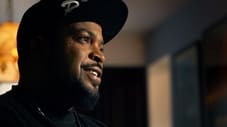
The Defiant Ones (2017)
← Back to main
Fab 5 Freddy as Self
Episodes 2
Part 2
With provocative recordings like "F**k the Police" and "Straight Outta Compton," shaped by the bitter race relations in Los Angeles, N.W.A. evolved into a force to be reckoned with, in LA and beyond. But a series of calamities--including personal losses on the streets, run-ins with the law, a bitter contract dispute, and a clash over management that strained Dre's relationship with Eazy-E--undermined the band and landed Dr. Dre at a crossroads, looking to make a fresh start. Meanwhile, Jimmy continued his rise up the music ladder via successful collaborations with Tom Petty and Stevie Nicks (with whom he had a relationship). But he hit a wall, and considered his own career shift, after a particularly arduous collaboration with U2--whose tireless drive in the studio rivaled his own.
Read MorePart 3
By 1989, Jimmy had parlayed his production expertise into a new career as co-founder of Interscope Records, committing the label to on-the-edge artists like Trent Reznor's Nine Inch Nails, Marilyn Manson, Gwen Stefani and No Doubt...and Dr. Dre, whose solo LP The Chronic had been recorded by Death Row Records, a post-N.W.A. label he created with Suge Knight, the D.O.C. and Dick Griffey. Blown away by Dre's singular talent, Jimmy cut a deal with Death Row for Interscope to become the label's distributor. The Chronic became a huge hit and spawned an ever bigger LP from Dre's protege, Snoop Dogg. But hostility was mounting across America towards the misunderstood violent influence of rap music, and Interscope and Time Warner (which owned 25% of the company) found themselves in the crosshairs of an angry political mainstream. As Jimmy resisted overtures to sell Interscope's stake in Death Row, Dre, along with Snoop Dogg and recent signee Tupac Shakur, became embroiled in a violent feud with East Coast rap rivals, notably Sean "Puffy" Combs and his Bad Boy Records, which drove Dre to seek out another new beginning.
Read More
